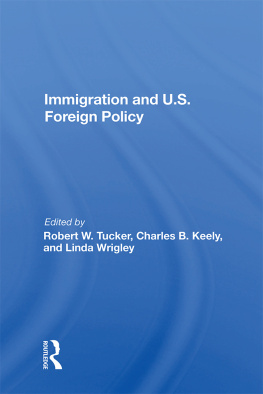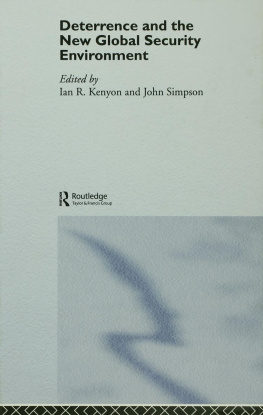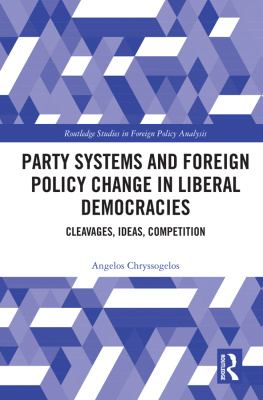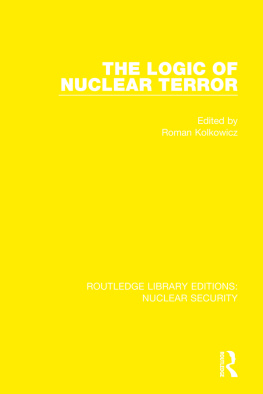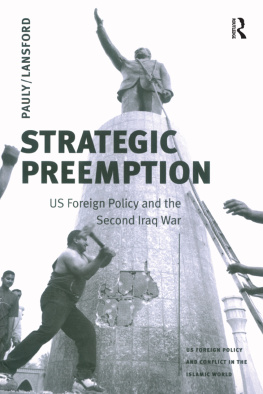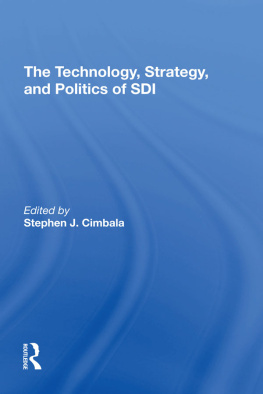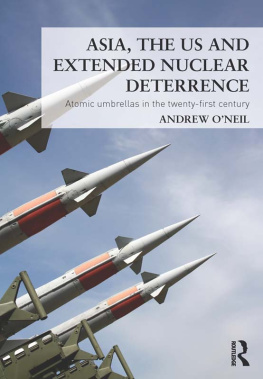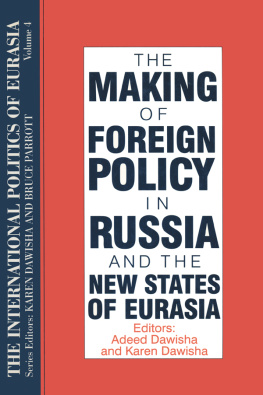SDI and U.S. Foreign Policy
THE JOHNS HOPKINS FOREIGN POLICY INSTITUTE
Harold Brown
Chairman
Simon Serfaty
Executive Director
Robert E. Osgood
Codirector
Security Studies Program
Wilfrid Kohl
Director
International Energy Program
Philip Geyelin
Editor-in-Residence
Michael Vlahos
Codirector
Security Studies Program
Nancy McCoy
Editorial Coordinator
George R. Packard
Dean, School of Advanced International Studies, The Johns Hopkins University
The Johns Hopkins Foreign Policy Institute (FPI) was founded in 1980 and serves as the research center for the School of Advanced International Studies (SAIS) in Washington, D.C. The FPI is a meeting place for SAIS faculty members and students as well as for government analysts, policymakers, diplomats, journalists, business leaders, and other specialists in international affairs. In addition to conducting research on policy-related international issues, the FPI sponsors conferences, seminars, and roundtables.
The FPI's research activities are often carried out in conjunction with SAIS's regional and functional programs dealing with Latin America and the Caribbean Basin, U.S. foreign policy, U.S.-Japan relations, Canada, Africa, Europe, security studies, international energy, and international economics.
FPI publications include the SAIS Review, a biannual journal of foreign affairs, which is edited by SAIS students; the SAIS Papers in International Affairs, a monograph series copublished with Westview Press in Boulder, Colorado; the FPI Policy Briefs, a series of analyses of immediate or emerging foreign-policy issues; and the FPI Case Studies, a series designed to teach analytical negotiating skills.
SDI and U.S. Foreign Policy is the fourth in a series of five books. This series is being prepared by the FPI as part of a research project on the long-term implications of military programs and activities in space for strategic stability, superpower relations, and alliance cohesion.
For additional information regarding FPI publications, write to: FPI Publications Program, School of Advanced International Studies, The Johns Hopkins University, 1740 Massachusetts Avenue, N.W., Washington, D.C. 20036.
About the Book and Authors
Showing how the development of space technology could affect the present system of deterrence, the authors consider the consequences for U.S. foreign policy, alliance relations, and strategic stability. In the first essay, Dr. Tucker argues that a greater commitment to defensive systems would not substantially affect deterrence or extended deterrence. Rather, if attainable, a ballistic missile defense (BMD) capability would only alter the character of our vulnerability to nuclear weapons. Dr. Liska suggests that a new offense-defense mix might enhance deterrence because of the greater uncertainty of military outcomes. He warns, though, that one side might risk a first strike if it perceives that the other is about to achieve invulnerability.
European responses to SDI are examined by Dr, Osgood, who maintains that the issue of defensive shields could become the chief obstacle to establishing a more stable offense-defense weapons mix acceptable to the allies. Although Europeans perceive technological benefits from a limited initiative, they are committed to a strategy of flexible response, safeguarded by the ABM treaty. In Dr. Calleo's view, the strategic dilemma of the United States can be improved only through a devolution of security responsibility. He argues that it is unrealistic to rely on a nuclear strategy that seeks to solve geopolitical problems through technology and stresses that Europe must gradually assume primary responsibility for its own defense.
Robert W. Tucker is the Edward B. Burling Professor of International Law and Institutions at SAIS. George Liska is professor of political science at The Johns Hopkins University. David P. Calleo is professor and director of European studies at SAIS.
Robert E. Osgood , who was the Christian A. Herter Professor of American Foreign Policy at SAIS, passed away shortly before publication of this book, which his coauthors wish to dedicate to his memory.
Number 15
Sais Papers in International Affairs
SDI and U.S. Foreign Policy
Robert W. Tucker
George Liska
Robert E. Osgood
David P. Calleo
First published 1987 by Westview Press
Published 2019 by Routledge
52 Vanderbilt Avenue, New York, NY 10017
2 Park Square, Milton Park, Abingdon, Oxon OX14 4RN
Routledge is an imprint of the Taylor & Francis Group, an informa business
Copyright 1987 by The Johns Hopkins Foreign Policy Institute, School of Advanced International Studies (SAIS)
All rights reserved. No part of this book may be reprinted or reproduced or utilised in any form or by any electronic, mechanical, or other means, now known or hereafter invented, including photocopying and recording, or in any information storage or retrieval system, without permission in writing from the publishers.
Notice:
Product or corporate names may be trademarks or registered trademarks, and are used only for identification and explanation without intent to infringe.
Library of Congress Catalog Card Number: 86-51674
ISBN 13: 978-0-367-28681-1 (hbk)
Contents
by Robert W. Tucker
by George Liska
by Robert E. Osgood
by David P. Calleo
Guide
In early 1985 The Johns Hopkins Foreign Policy Institute (FPI) of the School of Advanced International Studies (SAIS) was awarded support from the Carnegie Corporation of New York to engage in a twenty-four-month study of the implications of extraatmospheric technologies for U.S. foreign and defense policies. The study was chaired by Harold Brown, former secretary of defense and now the FPI chairman. It concentrated on the military implications of new technologies in space, including both support missions, such as communication and surveillance, and weapons aimed at satellites or at ballistic missiles. It took as its major premise the assumption that such space technologies are bound in some way to expand, limit, or define the options of future policymakers.
Throughout this program specific consideration was given to such questions as:
- Is "advantage" in space critical to future national security? How is advantage defined, and can technologies now under development credibly offer such advantage?
- What effects will various alternative policies for both developing and limiting the military uses of space have on the likelihood of nuclear waror on its nature if it occurs?
- How is the traditional arms-control process applicable to space-based systems? Should arms-control objectives be limited from the outset? For example, can meaningful distinctions be made between antisatellite weapons (ASATs) and antiballistic missiles (ABMs)? Between low- and high-altitude ASATs? How do U.S.-Soviet negotiations on these matters relate to those on strategic or intermediate-range offensive nuclear forces? If space systems offer the potential for reinforcing national security, what share of the overall defense budget do they require? How should this allocation be divided among support systems and weapons?


